Domaine Lafage’s commercial director, Ramuntxo Andonegui, is talking about the lack of water in Roussillon, South of France. He likens the rainfall levels there to Morocco and Jordan.
“So, we try to find solutions; we try to find ways to maintain vineyards in our place and to be inspired by these people who are already adapting themselves to this reality.”
By ‘these people’ he means fellow members of the five-year-old International Wineries for Climate Action (IWCA), which has 48 members from 12 countries and five continents. Each has set the ambitious goal of reaching net zero by 2050.
How are they reducing their carbon footprints?
Canopy checked out their newest wines at an IWCA tasting event in London to uncover the latest initiatives in sustainable wine production. Katie Jackson, president of the IWCA and senior vice-president of corporate responsibility at Jackson Family Wines (one of the IWCA’s founding wineries), described these wines as “the benchmark in low-emission production – a category that we are working to promote globally so that consumers have the choice to choose wines that have minimal environmental impact at point of purchase”.
How producers are reducing their carbon footprints
DOMAINE LAFAGE
Name of wine: Moutou
Vintage: 2022
Grapes: 94% Grenache Noir, 6% Syrah
ABV: 13.5%
RS: 2g/L
TA: 4g/L
Winemaking: Traditional with 50% whole bunches, daily pump-overs, 36-day vatting, and ageing on lees for 18 months in a 5,000L barrel.
Packaging: 23% lighter bottle topped with a wax cap.
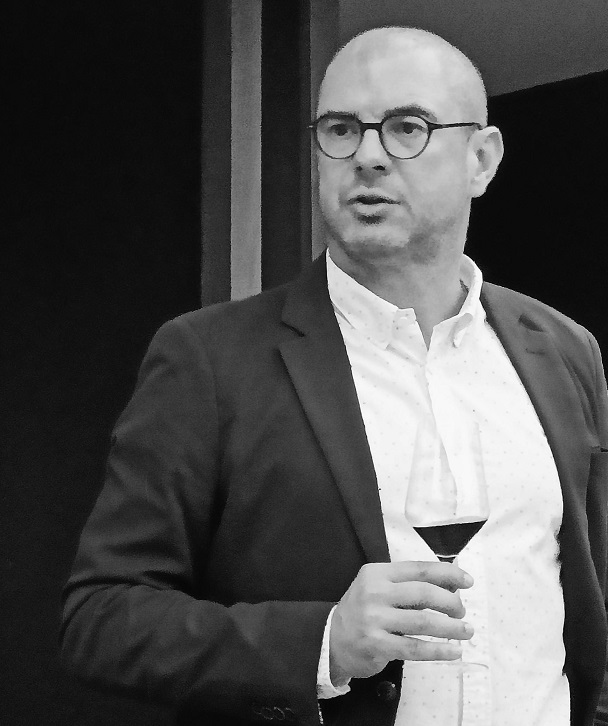
Low-emission story: The grapes come from an experimental vineyard using regenerative practices, which include low-density cover crops, no tilling, integrated biological control (including bat and chickadee nesting boxes), and the use of biochar. Biochar, a carbon-rich material obtained from the pyrolysis of biomass feedstocks (including vine cuttings), can increase the soil’s fertility and, according to Ramuntxo (above), “will help optimise bacteria and give more richness – which is connected to regenerative viticulture”.
Adding the biochar to the soil should also improve biodiversity and water retention, he says. Ramuntxo estimates biochar “could reduce by 50% our carbon footprint, which is huge. It’s really exciting”.
Exploring the potential of biochar is one of the big projects at the family winery. The other big project is finding water to irrigate the vines. They are currently consulting with a local wastewater treatment plant to see if it’s possible to divert some of the treated water, which is currently pumped into the Mediterranean Sea.
CHAMPAGNE PIPER-HEIDSIECK
Name of wine: Essentiel Blanc de Noirs
Vintage: NV
Grapes: 80% Pinot Noir, 20% Meunier
ABV: 12%
RS: 5g/L
TA: 6.3g/L
Winemaking: A slow pressing close to the vineyards. Temperature-controlled fermentation, using selected yeasts, in stainless-steel vats. 100% MLF. Ageing on lees for a minimum of 36 months.
Low-emission story: This Champagne is produced using grapes from VDC- and HVE-certified vineyards and comes in “eco-concept” packaging with a category-light bottle (835g) which is produced within 30km of the winery. No gift boxes are going to be used.
CHÂTEAU TROPLONG MONDOT
Name of wine: Château Troplong Mondot
Vintage: 2019
Grapes: 85% Merlot, 13% Cabernet Sauvignon, 2% Cabernet Franc
ABV: 15%
RS: 0.55g/L
TA: 3.34 g/L
Winemaking: Aymeric de Gironde has been limiting green harvesting and deleafing to boost freshness and reduce over-concentration, and harvesting earlier. MLF was carried out in tank instead of barrel this vintage. Aged for 18 months in 60% new oak and 40% second-fill barrels.
Low-emission story: 2019 marks the set-up of Troplong Mondot’s revolutionary heating system, which is fuelled by the vine shoots pruned in winter and transformed into pellets (which are compatible with a wider range of boilers). The Saint Emilion estate has been working on the recycling of its waste, in particular vine shoots, since 2006. “We do not want to crush them or leave them to decompose in the vineyard, mainly because of the problems of ground load capacity of our soils during winter, but also because of the risk of disease,” they say. Converting this biomass into an energy source allows them to make use of this waste, but also to use a more sustainable source of energy than electricity or fossil fuel.
DOMAIN BOUSQUET
Name of wine: Bousquet Reserve Organic Malbec
Vintage: 2022
Grapes: 85% Malbec, 5% Cabernet Sauvignon, 5% Merlot, 5% Syrah
ABV: 14.5%
RS: 1.8
Winemaking: Cold maceration at 10°C (50°F) for 48 hours. Fermentation with selected yeasts at a temperature between 25-27°C (77-80°F) for 10 days and 14 days of additional maceration. 100% MLF and aged in contact with French oak for 6 months.
Low-emission story: In 2007, Domaine Bousquet became the first winery in Argentina to use lightweight glass bottles. At present, 80% of their bottles are lightweight (sub 440g), increasing shipping capacity by 30%. Further carbon reductions have been brought about via in-market bottling in the US, UK, and Europe – simultaneously reducing shipments of cork, bottles, and labels.
FAMILIA TORRES
Name of wine: Clos Ancestral White
Vintage: 2023
Grapes: 85% Forcada, 15% Xarel·lo
ABV: 12.5%
RS: <0.5g/L
TA: 6.67g/L
Winemaking: Fermentation in stainless steel at 15-17ºC for 10-12 days. Ageing on fine lees for 3 months before bottling in March 2024.
Packaging: 395g bottles
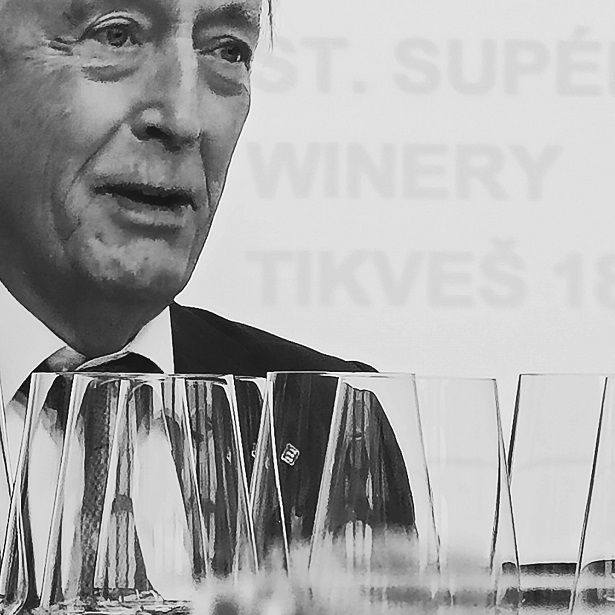
Low-emission story: For 40 years, Familia Torres has recovered more than 50 Catalan ancestral varieties from oblivion to help restore the viticulture heritage of Catalonia. Over time, research showed that some of these varieties not only displayed great winemaking potential but were also extremely resistant to high temperatures and water scarcity. This is true of Forcada, a white pre-phylloxera variety which Familia Torres has planted in a vineyard located at an altitude of 550m in Penedès.
The great thing about Forcada, according to Miguel Torres (above), is that “you cannot compare it with other white grape”. He believes it will become an important grape in Spain because it retains its acidity, even after hot summers.
“We are very proud of it,” he told me.
Familia Torres will have more than 600ha of vines under regenerative practices by the end of this year. The Forcada already comes from a vineyard managed this way: cover crops to increase water infiltration and fix atmospheric CO2, vertical tillage (instead of conventional ploughing), and flocks of sheep in the vineyards to manage cover corps and fertilise the soil, while also reducing the use of tractors.
Familia Torres will reach 55% self-sufficiency in energy this year thanks to the solar and biomass energy produced in its main winery in Penedès, where Clos Ancestral white is made. The winery also uses a carbon capture and reuse system. “It has enabled us to stop buying CO2 from the chemical industry by using the natural CO2 from the fermentation process,” Miguel explained.
HERÈNCIA ALTÉS
Name of wine: Herència Altés Garnatxa Blanca
Vintage: 2023
Grape: 100% Garnatxa Blanca
ABV: 13%
RS: 0.5g/L
TA: 5.6g/L
Winemaking: Manual harvest to make a selection in the field of the best quality grapes. Upon arrival at the winery, the whole bunches are sent directly to the press to minimise contact with the skins. Only the first fraction of the pressed must is used, the “mosto flor” (free-run juice), which represents a yield of 35-40%. Controlled oxidation of the must until saturation and subsequent spontaneous fermentation in stainless-steel tanks. After fermentation, the wine is kept on its fine lees for three months with regular bâtonnage to give the wine more structure, creaminess and a longer life.
Low-emission story: Herència Altés Garnatxa Blanca 2023 comes from an organic vineyard and a winery that uses 95% renewable energy for much of the year. Recycled rainwater is used for cleaning. Bottle weight has been reduced from 600g a few years ago to 410g. Rafael De Haan, co-founder and owner, points out: “With a 600g bottle, we can load 600 bottles on a pallet. With this lighter bottle, we can go up to 648 or even 840 bottles, so fewer pallets coming in and fewer pallets going out.”
In 2016, Herència Altés started a process to help recover and restore local wildlife and plants and their habitats in the Lo Grau de l’Inquisidor vineyards. There, they have planted thousands of native plants and trees to recreate natural habitats as well as a botanical garden with its own natural pond.
They have also installed bat shelters and nesting boxes for insect-eating birds around the vineyards to help reduce the pests and diseases which affect vines. In addition, they have assisted in the reintroduction of barn owls and kestrels, and they have joined the Catalan Butterfly Monitoring Scheme, a network of observers carrying out a regular census of butterfly populations.
BODEGA EMINA RIBERA
Name of wine: Emina Emoción
Vintage: 2019
Grape: 100% Tempranillo
ABV: 14%
RS: < 4 g/L
TA: 5,10 g/L
Winemaking: MLF and 16 months’ ageing in French oak barrels.
Packaging: Lightweight bottles, plastic-free capsules, recycled cardboard.
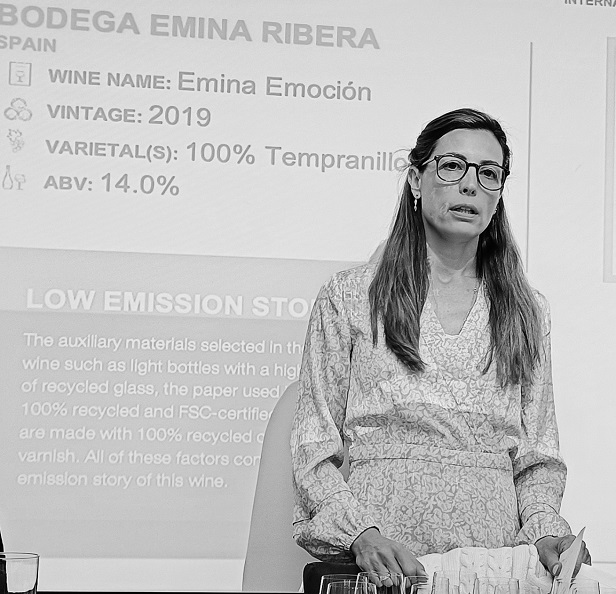
Low-emission story: Bodega Emina Ribera, which has been measuring its carbon footprint since 2017, has teamed up with a paper company to research ways of turning vine cuttings into paper for labels. Previously they were using the old shoots for creating biomass energy.
VSPT WINE GROUP
Name of wine: Tayu 1865
Vintage: 2022
Grape: 100% Pinot Noir
ABV: 13.5%
RS: 0.7g/L
TA: 5.6g/L
Winemaking: The grapes – transported in trays by refrigerated lorries – were sorted at the winery. 30% of the grapes were left as whole clusters. The grapes from different plots and clones were vinified separately. All the must was fermented with native yeasts in either concrete or stainless-steel vats at a temperature of 24-26°C. The maceration was brief and the ageing lasted 10 months. 22% of the blend was aged in foudres, 13% in concrete vats, 41% in used barrels (4 years of use) and 24% in stainless steel.
Low-emission story: In 2015, Viña San Pedro started working with two families from the Mapuche community in the Malleco Valley, in Chile’s Araucanía region, to grow Pinot Noir grapes. It’s the first time that a Mapuche community has focussed on viticulture. The winery pays in advance for the grapes to ensure that the growers have the funds they need to plant and acquire the equipment for their work.
Today, there are a total of 27.5ha of vineyards planted on the community’s own land, enabling 11 families to produce and receive a profit from them. Previously, members of the community were abandoning their land in search of employment opportunities, mainly with forestry companies.
QUINTA DOS CARVALHAIS/ SOGRAPE
Name of wine: Quinta dos Carvalhais Encruzado
Vintage: 2022
Grape: 100% Encruzado
ABV: 13%
RS: 0.1g/L
Winemaking: The grapes arrived at the winery in 20kg boxes, which were unloaded into a pneumatic press. After the pressing of the grape clusters, the must was subject to static decanting at low temperatures for 24 hours. The wine was subsequently transferred to stainless-steel tanks where fermentation took place. Half the wine proceeded to barrels of new French oak where it fermented at a maximum of 19ºC for a period of 20 days. 70% was fermented and aged for around 6 months in different-sized barrels of French oak (225, 500, 1,000 and 2,000L). During this period, the wine frequently underwent bâtonnage to increase the sense of body on the palate and allow the wood to add complexity to the aroma. The remainder fermented and aged in stainless-steel tanks, contributing to a greater balance in the final blend.
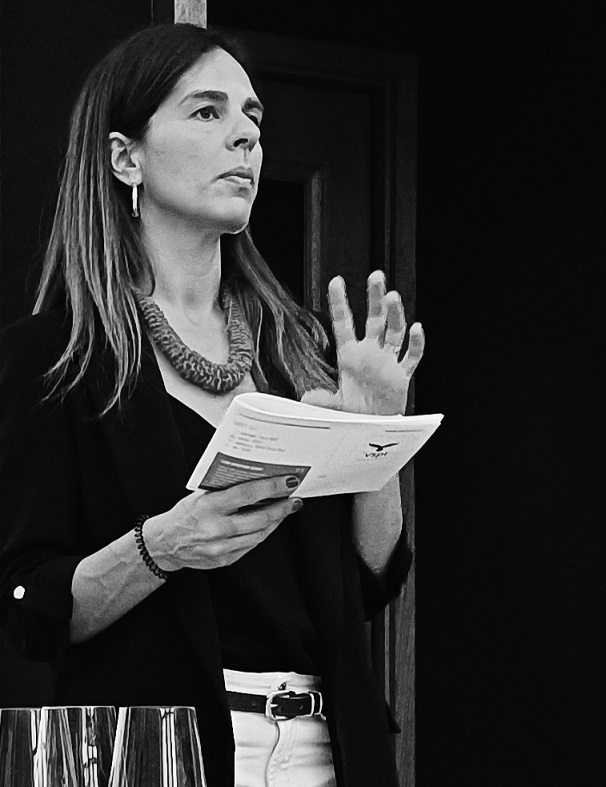
Low-emission story: The Encruzado, a treasured Portuguese grape variety found solely in Dão, reflects Sogrape’s commitment to genetic diversity. The estate is described as “a living mosaic – a harmony of forests, woodlands, legumes, and fruit plants that sustainably coexist”. Sheep keep the weeds in check.
Sogrape’s head of corporate communications and sustainability, Mafalda Guedes (above) says: “We’re committed to stop the loss of biodiversity and to recover the biodiversity which has been lost until now.”
KIR-YIANNI
Name of wine: Assyrtiko The North
Vintage: 2023
Grape: 100% Assyrtiko
ABV: 13.5%
RS: 1.4g/L
TA: 5.8g/L
Winemaking: As the name suggests, the Assyrtiko grapes come from parcels in northern Greece – specifically, from the village of Agios Panteleimonas in the plateau of Amyndeon. The handpicked grapes are manually sorted on a conveyor belt at the winery before some skin contact, fermentation in tanks, and 4-5 months’ ageing in contact with the lees.
Packaging: 410g bottles (50% recycled glass).
Low-emission story: In the vineyard, it’s all about regenerative viticulture, soil health, no tillage, integrated pest management, caring on a vine-by-vine basis, and agroforestry. At the winery, it’s photovoltaic panels, heat pumps, LED lighting, recycling (glass, paper, plastic, machine oil), re-use schemes (pomace compost, tsipouro production), bio water waste treatment, and a gradual transfer to lightweight bottles.

 English
English French
French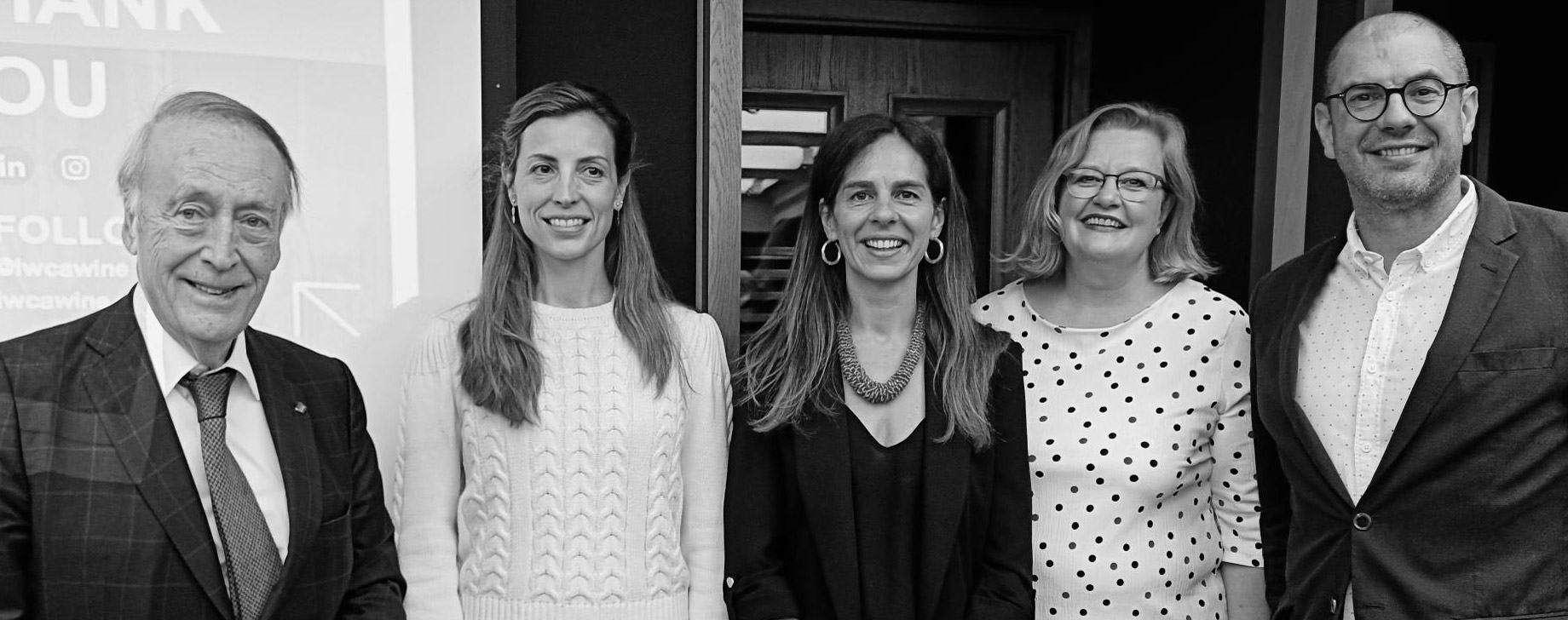







.png)


